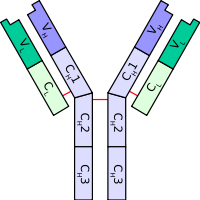
Idiotype
Encyclopedia

Immunology
Immunology is a broad branch of biomedical science that covers the study of all aspects of the immune system in all organisms. It deals with the physiological functioning of the immune system in states of both health and diseases; malfunctions of the immune system in immunological disorders ; the...
, an idiotype is a shared characteristic between a group of immunoglobulin or T cell receptor
T cell receptor
The T cell receptor or TCR is a molecule found on the surface of T lymphocytes that is responsible for recognizing antigens bound to major histocompatibility complex molecules...
(TCR) molecules based upon the antigen
Antigen
An antigen is a foreign molecule that, when introduced into the body, triggers the production of an antibody by the immune system. The immune system will then kill or neutralize the antigen that is recognized as a foreign and potentially harmful invader. These invaders can be molecules such as...
binding specificity and therefore structure of their variable region. The variable region of antigen receptors of T cell
T cell
T cells or T lymphocytes belong to a group of white blood cells known as lymphocytes, and play a central role in cell-mediated immunity. They can be distinguished from other lymphocytes, such as B cells and natural killer cells , by the presence of a T cell receptor on the cell surface. They are...
s (TCRs) and B cell
B cell
B cells are lymphocytes that play a large role in the humoral immune response . The principal functions of B cells are to make antibodies against antigens, perform the role of antigen-presenting cells and eventually develop into memory B cells after activation by antigen interaction...
s (immunoglobulins) contains a complementarity determining region
Complementarity determining region
Complementarity determining regions are regions within antibodies or T cell receptors where these proteins complement an antigen's shape. Thus, CDRs determine the protein's affinity and specificity for specific antigens...
(CDR) with a unique amino acid
Amino acid
Amino acids are molecules containing an amine group, a carboxylic acid group and a side-chain that varies between different amino acids. The key elements of an amino acid are carbon, hydrogen, oxygen, and nitrogen...
structure that determines the antigen specificity of the receptor. The structure formed by the CDR is known as the idiotope. Immunoglobulins or TCRs with a shared idiotope are the same idiotype. Antibody idiotype is determined by
- Gene rearrangement
- Junctional diversity
- P-nucleotides (palindromic nucleotides at sites of single-strand breaks)
- N-nucleotides
- Somatic hypermutations
The term idiotype is sometimes used to describe the collection of multiple idiotopes, and therefore overall antigen binding capacity, possessed by an antibody.
The word idiotype became influential in immunology when Niels Jerne formulated his immune network theory
Immune network theory
The immune network theory is a theory of how the adaptive immune system works, that has been developed since 1974 mainly by Niels Jerne and Geoffrey W. Hoffmann. The theory states that the immune system is an interacting network of lymphocytes and molecules that have variable regions...
. Jerne was awarded the Nobel Prize for Medicine or Physiology in 1984 largely for being the father of immune network theory. He defined idiotype as the set of epitopes on the V region of an antibody molecule, where epitope means an antigenic determinant. He also defined the "paratope
Paratope
The paratope is the part of an antibody which recognises an antigen, the antigen-binding site of an antibody. It is a small region of the antibody's Fv region and contains parts of the antibody's heavy and light chains....
" to be that part of an antibody variable region that binds to an antigen. The best developed version of immune network theory is called the symmetrical network theory, in which the distinction between idiotype and paratope plays no role.
External links
- Overview at Medical University of South CarolinaMedical University of South CarolinaThe Medical University of South Carolina opened in Charleston, South Carolina in 1824 as a small private college for the training of physicians. It is one of the oldest continually operating school of medicine in the United States and the oldest in the Deep South...
- Overview at Southern Illinois University CarbondaleSouthern Illinois University CarbondaleSouthern Illinois University Carbondale is a public research university located in Carbondale, Illinois, United States. Founded in 1869, SIUC is the flagship campus of the Southern Illinois University system...

